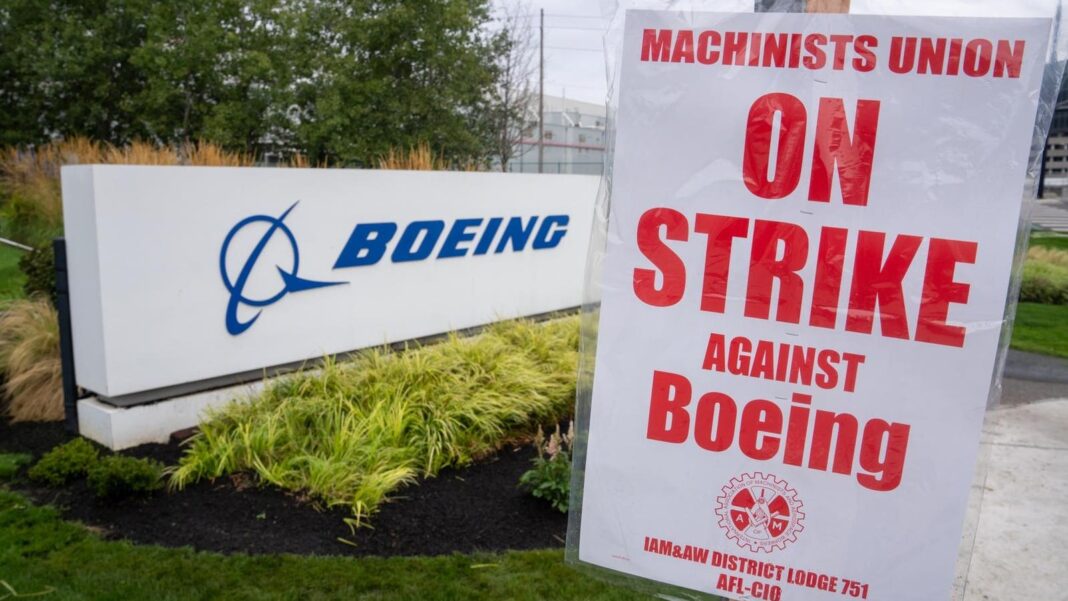Topline
Employees at Boeing’s St. Louis defense factories rejected a contract offered by the aerospace giant Sunday afternoon and around 3,200 workers began striking starting at midnight—the first walk out the company has faced at its St. Louis defense hub since 1996.
About 3,200 workers in Missouri and Illinois rejected an offer on Sunday.
Getty Images
Key Facts
The International Association of Machinists and Aerospace Workers, the union representing about 3,200 workers in St. Louis, St. Charles, Missouri, and Mascoutah, Illinois, voted against an offer from Boeing, which would have raised wages by 20%.
Workers walked off the job at Boeing’s defense factories at midnight, seven days after their previous contract expired.
Union members previously “overwhelmingly” rejected a contract offer on July 27, the IAM said, noting “the proposal from Boeing Defense fell short of addressing the priorities and sacrifices of the skilled IAM Union workforce.”
The workers in the three impacted factories assemble crucial missile systems and aircraft, including the F-15 and the F/A-18, according to their union.
Boeing did not immediately return a request for comment from Forbes, but Boeing executive Dan Gillian told Bloomberg in a statement the company was “prepared” for the strike and had a “fully implemented contingency plan.”
Crucial Quote
“IAM District 837 members have spoken loud and clear, they deserve a contract that reflects their skill, dedication, and the critical role they play in our nation’s defense,” local union lead Tom Boelling said in a statement. Brian Bryant, the union’s international president, added that IAM “will be there on the picket lines, ensuring Boeing hears the collective power of working people.”
Key Background
The last time workers at Boeing’s St. Louis area facilities went on strike was in 1996, when over 6,000 workers at facilities then operated by McDonnell Douglas (the two aerospace companies would merge about one year later) walked off the job for 99 days. Boeing faced a much larger machinist strike last year when around 33,000 workers in Washington factories producing major commercial jets like the 737 and the 777 walked off the job in September. The strike lasted for 53 days, ending on Nov. 4 after workers agreed to a contract that secured a 38% raise over the next four years.
Tangent
The pending strike in the Midwest comes as Boeing faces regulator pressure over safety concerns, after the door plug of a 737 MAX 9 operated by Alaska Airlines blew off mid-flight in January 2024, leading to the Federal Aviation Administration briefly grounding the jets. The 737 MAX series of aircraft faced scrutiny for years after a series of deadly crashes, including the 2018 Lion Air Flight 610 that killed 189 people off the coast of Indonesia and the 2019 Ethiopian Airlines Flight 302 crash that killed 157 people. Former CEO Dave Calhoun announced in March 2024 he would step down by the end of the year. Kelly Ortberg succeeded him as CEO in August 2024 and immediately called for a “fundamental culture change in the company.” Recently, the company’s 2025 second quarter earnings call was cautiously optimistic. Boeing reported $22.7 billion in earnings for the quarter, its highest since 2019. The company also delivered 150 commercial airplanes in the second quarter, up from just 92 during the same period in 2024. These all helped to halve the company’s losses to $612 million for the quarter—a notable improvement compared to the $1.2 billion lost last year at the same time. Boeing’s stock is up more than 24% year to date, far outpacing major indexes, but its $221.90 share price at market close Friday was still almost half of the $446.01 per share the stock closed at on March 1, 2019.

